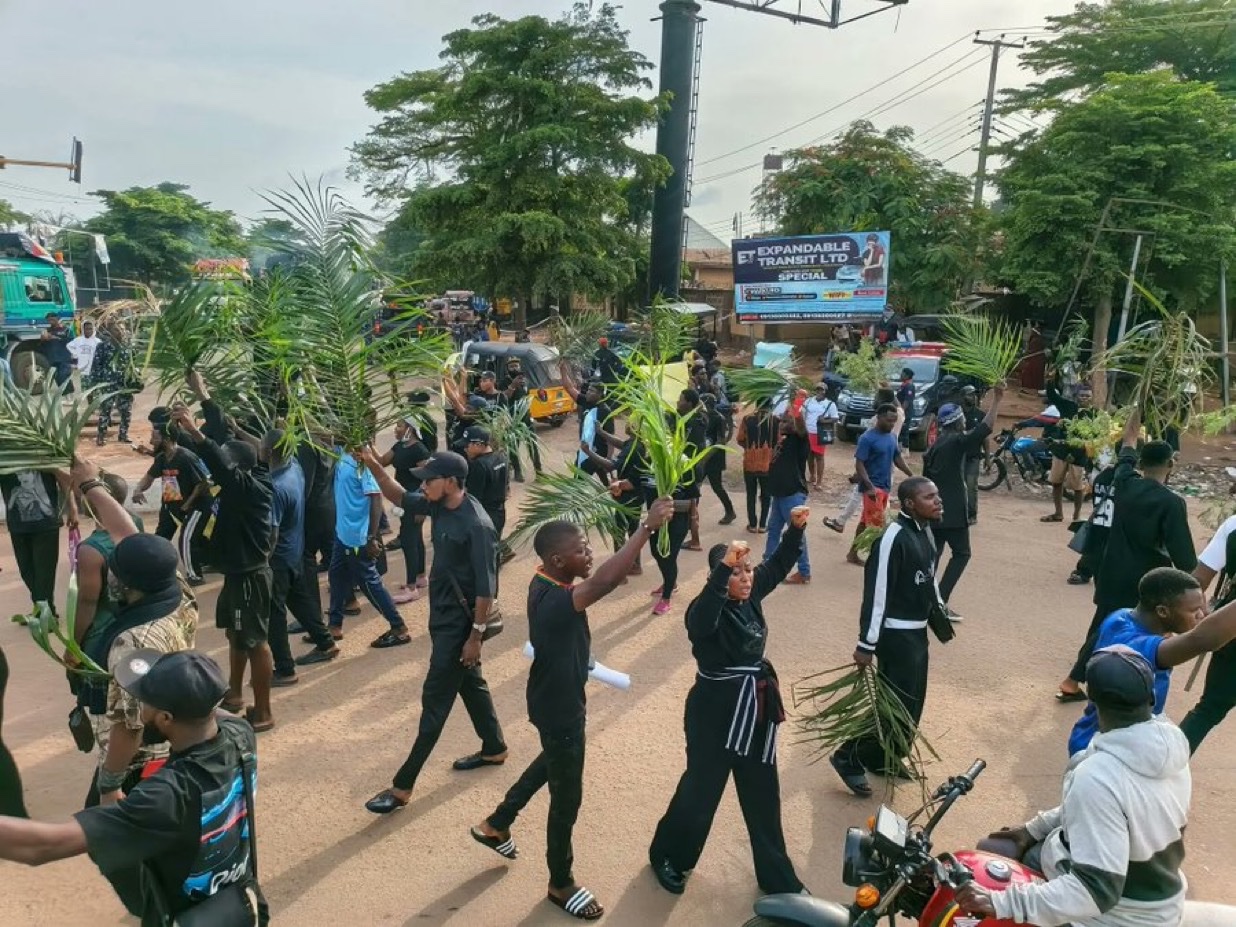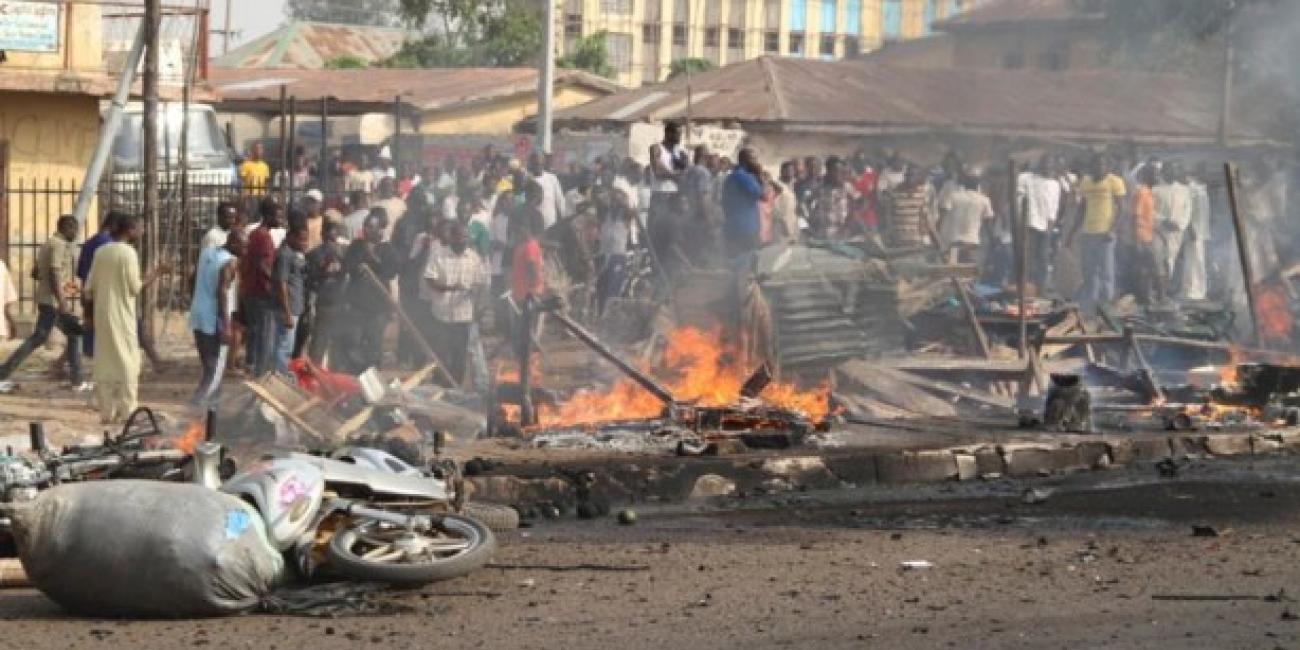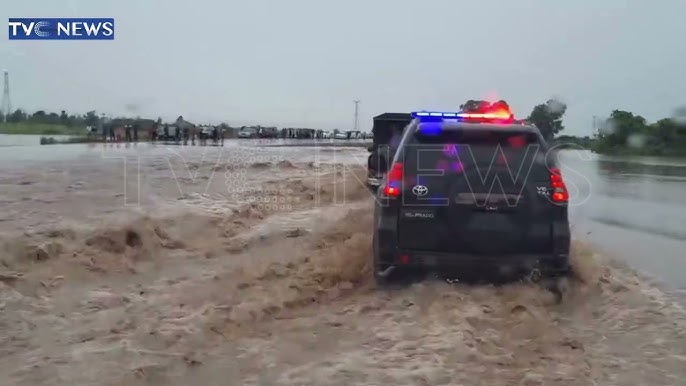On Sunday, June 15, 2025, hundreds of Benue youths took to the streets of Makurdi, the state capital, to protest the relentless wave of killings plaguing Benue State, particularly in rural communities. The demonstrators, clad in black attire and wielding palm fronds and placards, blocked the strategic Abuja-Makurdi highway at Wurukum Roundabout, bringing vehicular movement to a standstill. Their action was a direct response to a brutal attack on Saturday, June 14, in Yelewata, a community in Guma Local Government Area, where suspected armed herdsmen reportedly killed over 200 people, including women and children.
The protest, which began in the early hours, saw youths chanting slogans and displaying placards with messages condemning the violence and demanding immediate government intervention. The attack in Yelewata, described as one of the deadliest in recent months, involved gunmen invading the community at dawn, shooting indiscriminately, and setting homes ablaze. Survivors recounted harrowing experiences of fleeing into nearby bushes, with many still unaccounted for, fueling the protesters’ anger over what they perceive as government inaction.
Benue State has been a flashpoint for herder-farmer conflicts for years, with communities in Guma, Gwer West, and Apa Local Government Areas bearing the brunt of recurring attacks. Official reports indicate that over 1,500 lives have been lost in the state since January 2024, with thousands displaced and farmlands destroyed, exacerbating food insecurity. The protesters accused both state and federal authorities of failing to implement effective security measures, despite repeated promises to curb the violence.
Security forces, including the Nigeria Police and military personnel, were heavily deployed to the protest site to prevent escalation. While the demonstration remained largely peaceful, tensions were palpable as the youths vowed to continue their action until concrete steps were taken to address the killings. The blockade caused significant disruptions, stranding commuters and commercial vehicles, with some travelers forced to seek alternative routes or abandon their journeys altogether.
The Benue State Government had issued a prior warning against unlawful gatherings, citing concerns over public order amid the rising insecurity. However, the youths, organized under local community groups, defied the directive, arguing that their right to protest was justified by the scale of the crisis. Community leaders, including representatives from Yelewata, joined the demonstration, calling for the deployment of additional security forces and the establishment of a special task force to tackle the armed herdsmen.
Eyewitnesses reported that the protesters also highlighted the economic toll of the violence, noting that farmers could no longer access their fields due to fear of attacks. Benue, often referred to as Nigeria’s “food basket,” has seen a sharp decline in agricultural output, contributing to rising food prices nationwide. The protesters demanded compensation for victims’ families and the reconstruction of destroyed communities, alongside long-term solutions to the herder-farmer conflict.
Local authorities acknowledged the protesters’ grievances but urged them to maintain peace and allow security agencies to address the situation. The state’s Commissioner for Information issued a statement expressing sympathy for the victims and promising ongoing efforts to collaborate with federal authorities to restore calm. However, such assurances have done little to quell public frustration, as similar promises in the past have yielded limited results.
The Abuja-Makurdi highway, a critical artery connecting Nigeria’s capital to the north-central region, remained blocked for several hours, with reports of stranded trucks carrying perishable goods. Commuters expressed mixed sentiments, with some supporting the protesters’ cause but others frustrated by the inconvenience. The protest underscored the growing desperation among Benue residents, who feel abandoned in the face of unrelenting violence.
Civil society organizations and human rights groups have also weighed in, calling for an independent investigation into the Yelewata attack and broader security failures in Benue. They criticized the lack of accountability for perpetrators, noting that few arrests or prosecutions have followed previous attacks. The groups urged the federal government to prioritize the protection of vulnerable communities and address the root causes of the conflict, including disputes over land and resources.
As the protest continued into the afternoon, community leaders met with local government officials to present a list of demands, including immediate humanitarian aid for displaced persons and enhanced security patrols in rural areas. The blockade was partially eased by evening, allowing limited traffic flow, but the youths vowed to resume their action if their demands were not met. The situation remains tense, with fears of further attacks looming over Benue’s already traumatized population.




